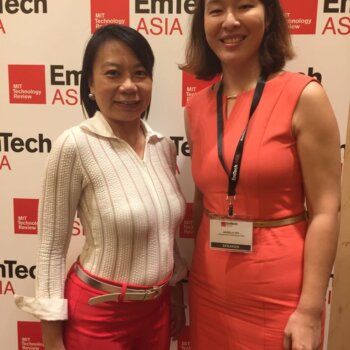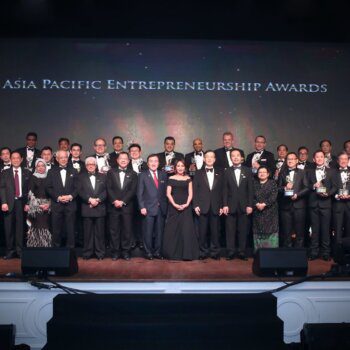(Women on Top in Tech is a series about Women Founders, CEOs, and Leaders in technology. It aims to amplify and bring to the fore diversity in leadership in technology.)
Here is our interview with Sabrine Assem, an Egyptian entrepreneur based in Cairo, who focused on empowering people with innovation. Sabrine is the CEO & Founder of Untap Technologies.
What makes you do what you do?
I believe in open and collaborative innovation as a way to find solutions to the persisting challenges facing developing countries and also to identify untapped talent and potential. I am always fascinated by the unexpected outcomes that may result from getting people with diverse experiences together.
In order for Egypt and other developing countries to advance, we need to have effective systems that capture and make use of the intellectual and creative capabilities and contributions of the people. There is a lot of wasted human potential, which is the root cause of the persistent challenges and social conflicts. Well-educated and innovative people are not in a position to communicate and enforce their solutions while challenges keep piling up without analysis.
Instead of trying to get the ineffective state to play its role as an innovation catalyst, one way to activate an innovation system is to get people to work on clearly identified challenges, collaborate, and submit solutions through open innovation platforms.
I am deeply inspired by the business model of the open innovation intermediaries and found it to represent a huge market opportunity if adapted to the needs of Arab countries and other developing nations. Enabling open innovation to be capitalized upon by developing countries and small organizations is a passion and a primary interest of mine; that’s why we created Untap.
How did you rise in the industry you are in?
Running a previous company for more than 3 years gave me the opportunity to expand my knowledge greatly, attend to a lot of networking conferences, and build a network that has an influence. Relationship building and my professional reputation are one of the most important elements that are helping my business grow. I share the updates of my work with my network to seek out constructive feedbacks and advice.
Why did you take on this role/start this startup especially since this is perhaps a stretch or challenge for you (or viewed as one since you are not the usual leadership demographics)?
I didn’t think it was a stretch because of my gender. Founding a company is challenging for both men and women. Living in Egypt is challenging for women, though on many levels that are not necessarily related to managing a company.
Do you have a mentor that you look up to in your industries or did you look for one or how did that work?
I have several mentors, to whom I am grateful. They have been helping me immensely along my entrepreneurial journey. However, they were not necessarily in my direct industry of open innovation management. These mentors outside of my industry help me even better because they give me different facets from my own perspective. My partner at Untap – Tarek Nasr – is actually a mentor of mine. He used to be my mentor at my previous start-up and he is the one who suggested us working together on Untap.
How did you make a match and how did you end up being mentored
by him?
I met many of my mentors through networking events. The person who is sharing my road since the beginning is Tarek, who I met in 2012 at a start-up speed-mentoring program. Ever since we became good friends and partners. He has regularly supported me and gave me valuable advice.
Now as a leader how do you spot, develop, keep, grow and support your talent?
I guess I didn’t yet find a “recipe” or a process yet. We are a team of 6.
Do you consciously or unconsciously support diversity and why?
There is a limited number of female Arabs in the business owners’ category. As a minority woman entrepreneur, I have been consciously vocalizing and encouraging diversity in the entrepreneurship ecosystem that I am in.
We don’t have enough Arab Women entrepreneurs in the scene, which makes it harder for anyone in this group to pave their startup journey and that’s why I am very vocal about diversity and support high-performance culture.
What is your take on what it takes to be a great leader in your industry and as a general rule of thumb?
No, take in that regard.
Advice for others? What does it take to be a great leader in your industry?
Don’t start a company for the sake of starting a company. Start a company only when you are crazy passionate about solving a particular challenge and you just want to spend all of your time on it.
To learn more about Untap Technologies, please see http://www.untap.tech/.
We are a huge fan and cheerleader of Women Leaders — If you know of an AMAZING Woman Founder, CEO, Leader in Tech or you are one yourself — Write us here.
AMPLIFY Conscious Business Leadership with me.
This article was co-written with Mariem Khemir.
LinkedIn: https://www.linkedin.com/in/mariem-khemir-36b52a85/































